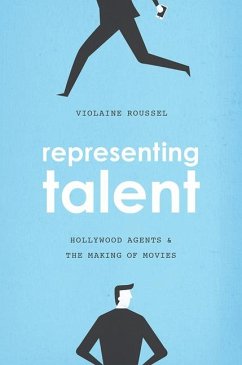In Representing Talent, Violaine Roussel investigates power, mediation, and deal-making in Hollywood with the agent front and center. The image we have of Hollywood agents often turns on the moguls who create their own empires, such as Ari Emanuel of William Morris Agency, inspiration for the character of Ari Gold in the HBO series Entourage. The agent (usually a male) is referenced often enough as a "shark," the kind of person who "can't feel other people's pain," or as a parasite who doesn't actually make anything, yet garners big profits from cinematic productions. Some truth may adhere to these stereotypes, but among the many agents Roussel interviewed for this book the premium put on integrity is high, and when it comes to the underlying opposition between art and commerce, most agents reject the moral suspicion associated with being on the business side of show-business. For the agent, signing a client is a bet on the future, and so an agent's ability to draw a bead on talent, based on aesthetic intuitions, becomes a springboard for the inspiration an actor-client or director-client can generate in the agent; it is the basis for his or her sense of the intimate tie an agent wants to create with a client. Far from being self-serving empire-builders who lack empathy, then, the successful Hollywood agent has to be more than a business-handler for the client--as one interviewee said, the agent is "part psychiatrist, part family member, whether father, mother, brother, sister, wife, husband, not in a physical sense, but certainly in an emotional and in an intellectual sense." Creating and maintaining emotional connections with clients is a prerequisite for the existence and success of the agents. As ethnography, Representing Talent investigates specific evaluation communities that can shape projects and careers. Roussel calls this an "occupational sociology of worth," approaching Hollywood, that is, in terms of professional networks within which the quality of people and projects is evaluated at the same time as their "value" is defined. She situates agents in their organizations, distinguishing the small agencies from the few big agencies. The agent creates strong ties with relevant counterparts (studio or network executives, producers, casting professionals, distributors), allies in the transaction of talent and projects (managers, lawyer, financiers, and so on), and of course actual and potential clients. These are the evaluation communities that comprise this study, and this helps us grasp the agents' power to affect who the artists are we get to know and admire, and what the entertainment products are that get offered to audiences.
Bitte wählen Sie Ihr Anliegen aus.
Rechnungen
Retourenschein anfordern
Bestellstatus
Storno

